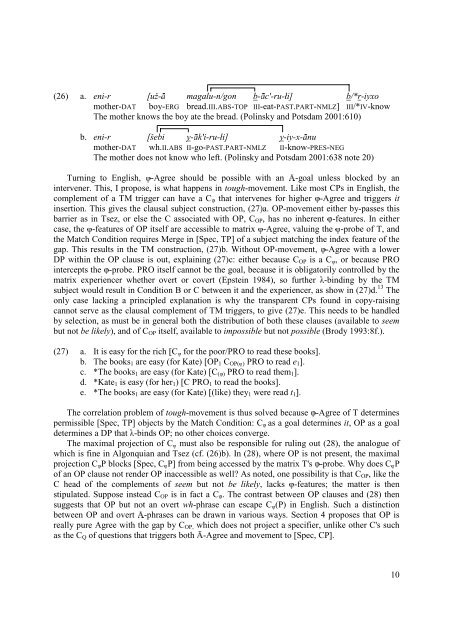1 On tough-movement* Milan Rezac, University ... - Multimania.co.uk
1 On tough-movement* Milan Rezac, University ... - Multimania.co.uk
1 On tough-movement* Milan Rezac, University ... - Multimania.co.uk
Create successful ePaper yourself
Turn your PDF publications into a flip-book with our unique Google optimized e-Paper software.
(26) a. [už-ā eni-r magalu-n/gon b-āc'-ru-łi] b/*r-iyxo<br />
mother-DAT boy-ERG bread.III.ABS-TOP III-eat-PAST.PART-NMLZ] III/*IV-know<br />
The mother knows the boy ate the bread. (Polinsky and Potsdam 2001:610)<br />
b. eni-r [šebi y-āk'i-ru-łi] y-iy-x-ānu<br />
mother-DAT wh.II.ABS II-go-PAST.PART-NMLZ II-know-PRES-NEG<br />
The mother does not know who left. (Polinsky and Potsdam 2001:638 note 20)<br />
Turning to English, φ-Agree should be possible with an Ā-goal unless blocked by an<br />
intervener. This, I propose, is what happens in <strong>tough</strong>-movement. Like most CPs in English, the<br />
<strong>co</strong>mplement of a TM trigger can have a C φ that intervenes for higher φ-Agree and triggers it<br />
insertion. This gives the clausal subject <strong>co</strong>nstruction, (27)a. OP-movement either by-passes this<br />
barrier as in Tsez, or else the C associated with OP, C OP , has no inherent φ-features. In either<br />
case, the φ-features of OP itself are accessible to matrix φ-Agree, valuing the φ-probe of T, and<br />
the Match Condition requires Merge in [Spec, TP] of a subject matching the index feature of the<br />
gap. This results in the TM <strong>co</strong>nstruction, (27)b. Without OP-movement, φ-Agree with a lower<br />
DP within the OP clause is out, explaining (27)c: either because C OP is a C φ , or because PRO<br />
intercepts the φ-probe. PRO itself cannot be the goal, because it is obligatorily <strong>co</strong>ntrolled by the<br />
matrix experiencer whether overt or <strong>co</strong>vert (Epstein 1984), so further λ-binding by the TM<br />
subject would result in Condition B or C between it and the experiencer, as show in (27)d. 13 The<br />
only case lacking a principled explanation is why the transparent CPs found in <strong>co</strong>py-raising<br />
cannot serve as the clausal <strong>co</strong>mplement of TM triggers, to give (27)e. This needs to be handled<br />
by selection, as must be in general both the distribution of both these clauses (available to seem<br />
but not be likely), and of C OP itself, available to impossible but not possible (Brody 1993:8f.).<br />
(27) a. It is easy for the rich [C φ for the poor/PRO to read these books].<br />
b. The books 1 are easy (for Kate) [OP 1 C OP(φ) PRO to read e 1 ].<br />
c. *The books 1 are easy (for Kate) [C (φ) PRO to read them 1 ].<br />
d. *Kate 1 is easy (for her 1 ) [C PRO 1 to read the books].<br />
e. *The books 1 are easy (for Kate) [(like) they 1 were read t 1 ].<br />
The <strong>co</strong>rrelation problem of <strong>tough</strong>-movement is thus solved because φ-Agree of T determines<br />
permissible [Spec, TP] objects by the Match Condition: C φ as a goal determines it, OP as a goal<br />
determines a DP that λ-binds OP; no other choices <strong>co</strong>nverge.<br />
The maximal projection of C φ must also be responsible for ruling out (28), the analogue of<br />
which is fine in Algonquian and Tsez (cf. (26)b). In (28), where OP is not present, the maximal<br />
projection C φ P blocks [Spec, C φ P] from being accessed by the matrix T's φ-probe. Why does C φ P<br />
of an OP clause not render OP inaccessible as well? As noted, one possibility is that C OP , like the<br />
C head of the <strong>co</strong>mplements of seem but not be likely, lacks φ-features; the matter is then<br />
stipulated. Suppose instead C OP is in fact a C φ . The <strong>co</strong>ntrast between OP clauses and (28) then<br />
suggests that OP but not an overt wh-phrase can escape C φ (P) in English. Such a distinction<br />
between OP and overt Ā-phrases can be drawn in various ways. Section 4 proposes that OP is<br />
really pure Agree with the gap by C OP, which does not project a specifier, unlike other C's such<br />
as the C Q of questions that triggers both Ā-Agree and movement to [Spec, CP].<br />
10
















